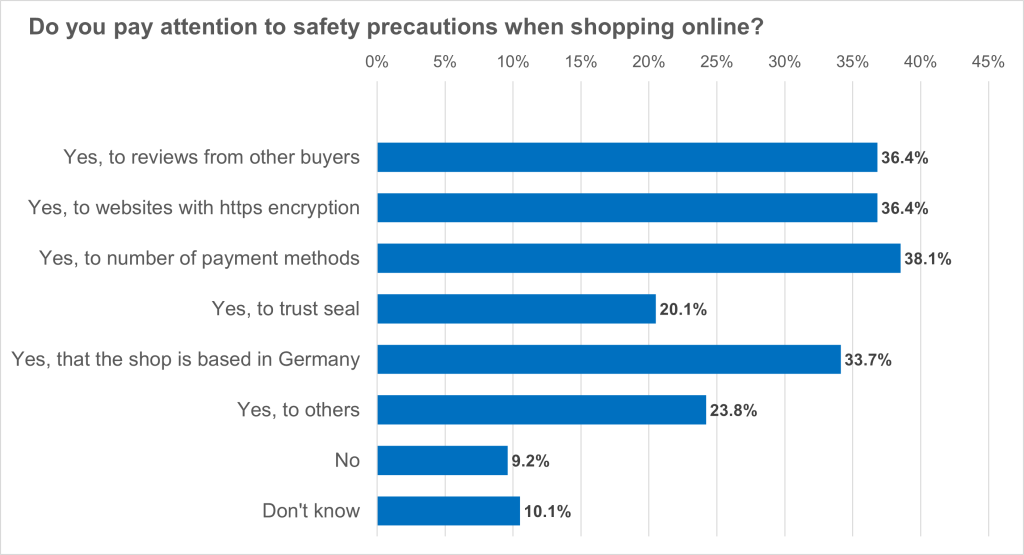- 38.1 per cent pay attention to different payment methods when shopping on the Internet
- Relevant reviews from 36.4 per cent of other shoppers
- eco Association gives 7 tips for shopping on Black Friday without concerns
With the Christmas shopping season beginning on Black Friday, 80.6 per cent of online shoppers are paying attention to security. As 38.1 per cent of shoppers see it, it’s important that a shop offers various payment methods. The reviews of others are relevant, with 36.4 per cent regarding encrypted data transmission – marked by the abbreviation https:// and a lock symbol in the web browser – as important. These are the results of a representative survey of 1,019 online shoppers conducted by the market and opinion research institute Civey on behalf of the eco – Association of the Internet Industry.
“In the frenzy of bargain hunting, customers should only make purchases from trustworthy retailers,” says eco Board Member for IT Security Prof Norbert Pohlmann. “This is evident, for example, in the shop being recommended by others. A secure and encrypted connection to the website and secure payment methods also indicate a reputable retailer,” Prof Pohlmann goes on to say. He gives a total of 7 tips for secure online shopping:
1. Only buy from trustworthy shops. Before you order anything online, you should make sure that the shop is reputable and trustworthy. This can be identified by:
- a detailed and correct legal notice with the provider’s full contact details
- seals of approval or certificates from independent test centres that confirm the quality and safety of the shop
- positive reviews and testimonials from other customers, which you can find on various platforms or portals
- a secure connection, recognisable by the lock symbol and the https protocol in the address bar of your browser
2. Be sceptical of overly tempting offers. Conspicuously low prices should make you suspicious. Fake shops deal in counterfeit or stolen goods or offer goods that do not exist and will never be delivered. Avoid such traps by always comparing prices with other shops and looking out for unrealistic discounts or enticing offers. If an offer seems to be too cheap to be true, you should become suspicious. The consumer advice centre can also help you determine whether a shop is known to be a fake shop.
3. Use a secure payment method, such as a credit card. Here you are protected by the so-called chargeback procedure. This means that in the event of a dispute with the retailer, you can reclaim the purchase amount via your credit card provider – for example, if you have not received the goods or they do not match the description. PayPal and Klarna are also secure payment methods. You should avoid insecure payment methods such as prepayment by bank transfer.
4. Keep an eye on your accounts and credit card statements if you have used this payment method online. This is the only way you can immediately identify and report on any unauthorised or incorrect charges.
5. Protect your personal data. When shopping online, always pay attention to what personal information you transfer to the shop and how it is stored and processed. Only provide the data that is necessary to process your order. All other data, in particular additional passwords, PINs or TANs, are not requested by reputable shops and should not be disclosed.
6. Use secure passwords. Passwords are the key to your online account. Therefore, choose strong passwords that consist of at least 12 characters and contain upper and lower case letters, numbers and special characters. Also use a different password for each shop. A password manager is recommended for memorising passwords. This generates secure passwords for you and stores them securely.
7. Utilise two-factor authentication if it is offered. Two-factor authentication (2FA) or two-step authentication (2SA) is an additional security measure that many online retailers offer to make unauthorised access to customer accounts more difficult. With 2FA, for example, you have to enter a code in addition to your password, which is sent to you by text message or email.





